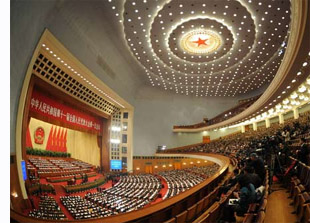NPC: National Energy Commission formed as ministerial level regulatory body
New ministry to absorb parts of 10 existing State-level agencies
 BEIJING, Mar. 11 – The Chinese National People’s Congress announced the establishment of a full cabinet level regulatory body for energy, consolidating the fuel-related responsibilities of different existing ministerial and sub-ministerial bodies to oversee the nation’s energy sector today.
BEIJING, Mar. 11 – The Chinese National People’s Congress announced the establishment of a full cabinet level regulatory body for energy, consolidating the fuel-related responsibilities of different existing ministerial and sub-ministerial bodies to oversee the nation’s energy sector today.
The National Energy Commission covers agencies responsible for oil, gas, coal, nuclear power and other renewable energy sources, pulling together previously disconnected divisions within the National Development and Reform Commission (NDRC), the State Electricity Commission, the China National Petroleum Corporation (CNPC), and the China Petrochemical Corporation (Sinopec) according to our sources attending the Chinese People’s Political Consultative Conference.
This uniting of various responsible agencies, as was predicted back in early January, brings to a close the era of relative disconnection of the energy sector, following the dissolution of the Ministry of Energy in 1993 by Deng Xiaoping following corruption and inefficiencies within the organization that led China close to a national economic collapse at the time.
Other functions of the National Energy Commission will be absorbed from the Ministries of Technology, Agriculture, Commerce, Water Resources and Land and Resources, in addition to other entities such as the State Administration of Work Safety, the State-Owned Assets Bureau and the Administration Commission.
The plan to unite the various factions into one Ministry had previously been raised five years ago during the 10th National People’s Congress, but was shelved to permit time to align the incumbent bodies together to allow for a smooth transition. The ministry will report directly to Premier Wen Jiabao who will directly control the nation’s energy policy.
The reorganization is timely. China’s increasing dependence on imported crude oil, which now makes up close to 50 percent of all its available supplies has put the country into a vise as global oil prices push higher and higher past US$100 a barrel. By 2020, it is estimated that China will need to import 70 percent of its domestic oil needs and 50 percent of its gas requirements, much of it from the Middle East.
The move comes hand in hand with Beijing’s recent decision to liberalize investment in the nation’s energy and power infrastructure areas and signals a determined effort to provide a more efficient and effective service to it’s rapidly developing economy.
Related articles
Beijing to increase foreign investment in national power sector
China to introduce resource tax system
China oil imports up 12.4 percent in 2007
China lays its stake on Central Asia
- Previous Article NPC: Private investors encouraged to invest in China’s railways
- Next Article Beijing Review, China’s most prestigious business publication, turns 50









